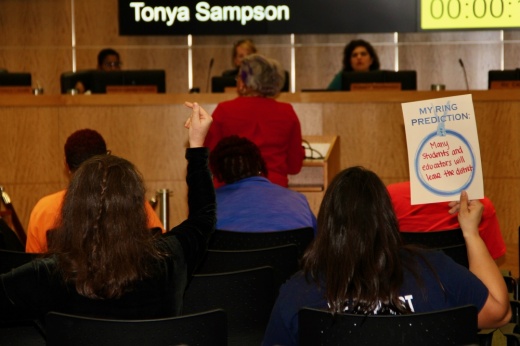The overview
Board managers voted to adopt the plan during the board’s Dec. 14 meeting after completing the required 30-day timeline for community members to review it online. The plan will allow the district to:
- Start the school year before the fourth Monday in August
- Hire uncertified teachers without obtaining a waiver from the Texas Education Agency
- Develop a local teacher appraisal system
- Have more flexibility in determining minimum attendance requirements for class credit for eligible high school students
- Host more professional development opportunities for district staff
- Opt out of sending students to a Disciplinary Alternative Education Program for the possession or sale of e-cigarettes or marijuana
According to the TEA, the designation will allow HISD to become exempt from certain sections of the Texas Education Code that inhibit the goals of the district as outlined in a locally adopted innovation plan.
A closer look
Superintendent Mike Miles has previously said one of the main aims of achieving the designation was to be able to allow for more instructional days during the school year.
HISD operates on a 172-day schedule. By adjusting the start date, officials said the district would be able to have up to 180 school days in the 2024-25 school year and up to 185 days in future school years.
To account for the additional workdays, Miles said the district will implement a new compensation package for district employees. However, further details concerning what that package will look like have not yet been provided.
Additionally, officials said the plan will allow the district to hire uncertified teachers without obtaining a waiver from the TEA.
Miles said the exemption would only be used to hire instructors teaching high school courses, and preference would be given to certified candidates. He noted the district would require uncertified teachers to obtain their certification within two years of being hired.
The plan will also allow the district to create its own teacher evaluation system. The district’s previous attempt to establish its own teacher evaluation system was halted by a Harris County judge in August after a lawsuit filed by the Houston Federation of Teachers questioned the legality in which the system was devised.
While it remains unclear whether the previously approved system will be used as a framework, the innovation plan highlights a need for a student-feedback component in evaluations and a more streamlined process to give administrators additional time to coach and develop teachers.
According to the plan, the district could implement the new evaluation system as early as the 2025-26 school year.
The final component included in the plan would give district officials discretion in determining whether to send a student to a Disciplinary Alternative Education Program when they’re caught possessing or selling e-cigarettes or marijuana.
While state law mandates Disciplinary Alternative Education Program placement for students under these circumstances, district officials said an exemption from that requirement could lead to better student outcomes and graduation rates.
“A recent study shows that students who were assigned to in-school suspension once had a 71% chance of graduating on time; meanwhile, students assigned to a DAEP center just once had a 44% chance of graduating within four years,” the plan states.
What they’re saying
More than a dozen community members were on hand at the meeting to share their thoughts on the plan.
Daniel Santos, vice president of the Houston Federation of Teachers, said he believed the plan failed to represent the needs and concerns of the community.
“The vote ... to approve the District of Innovation plan was illegitimate because it rejected genuine collaboration with the community and genuine representation of the community as a whole,” Santos said. “The DOI plan is dangerous and unsustainable. Despite the false claims, hiring uncertified teachers and implementing a flawed punitive evaluation plan will result in diluting the quality of instruction.”
Trista Bishop-Watt praised the plan, noting she believed students throughout the district could have benefitted from an earlier start to the school year.
“Our students did not get the benefit of those additional days of learning for one key reason: HISD is not a District of Innovation,” Bishop-Watt said. “HISD is part of just 5% of districts in the state not taking advantage of this flexibility. ... With less than half of HISD students reading at grade level by third grade, it’s clear the status quo is not working.”
What’s next
The district will have 15 days to send its adopted plan to the TEA to officially achieve its District of Innovation designation.
All exemptions included in the plan are effective for five years from the date of its adoption, according to the TEA. If the district receives unacceptable academic or financial performance ratings for two consecutive years, the TEA commissioner may terminate the innovation plan or require the district to amend its plan.
If the district receives unacceptable academic or financial performance ratings for three consecutive years, the commissioner is required terminate the innovation plan, TEA officials said.





